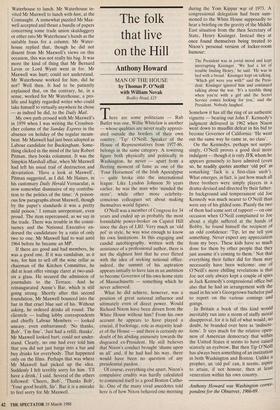The folk that live on the Hill
Anthony Howard
MAN OF THE HOUSE by Thomas P. O'Neill with William Novak
Bodley Head, £15
There are some politicians — Rab Butler was one, Willie Whitelaw is another — whose qualities are never really appreci- ated outside the borders of their own country. 'Tip' O'Neill, Speaker of the House of Representatives from 1977-86, belongs in the same category. A towering figure both physically and politically in Washington, he never — apart from a fleeting moment of fame as one of the `Four Horsemen' of the Irish Apocalypse — quite broke into the international league. Like Lyndon Johnson 30 years earlier, he was the man who 'minded the store', while other more celebrity- conscious colleagues set about making themselves world figures.
O'Neill was a member of Congress for 34 years and ended up as probably the most formidable power-broker on Capitol Hill since the days of LBJ. Very much an 'old pol' in style, he was wise enough to know his own limitations. In this engaging and candid autobiography, written with the assistance of a professional author, there is not the slightest hint that he ever flirted with the idea of seeking national office: indeed, the summit of his aspiration appears initially to have lain in an ambition to become Governor of his own home state of Massachusetts — something which he never achieved.
What he did achieve, however, was a position of great national influence and ultimately even of direct power. Would Richard Nixon have been driven from the White House without him? From his own account he appears to have played a crucial, if backstage, role as majority lead- er of the House — and there is certainly no doubt of his abiding animosity towards the disgraced ex-President. He still believes that Nixon's conduct brought 'shame upon us all' and, if he had had his way, there would have been no question of any presidential pardon.
Of course, everything else apart, Nixon's compulsive crudity was hardly calculated to commend itself to a good Boston Catho- lic.- One of the many vivid anecdotes told here is of how Nixon behaved one morning during the Yom Kippur war of 1973. A congressional delegation had been sum- moned to the White House supposedly to hear a briefing on the gravity of the Middle East situation from the then Secretary of State, Henry Kissinger. Instead they at once found themselves being treated to Nixon's personal version of locker-room humour:
The President was in jovial mood and kept interrupting Kissinger. 'We had a lot of trouble finding Henry,' he said. 'He was in bed with a broad.' Kissinger kept on talking. `Which girl were you with?' said the Presi- dent. Kissinger ignored him and continued talking about the war. 'It's a terrible thing when you're with a girl and the Secret Service comes looking for you,' said the President. Nobody laughed.
Somehow it has all the ring of an authentic vignette — bearing out John F. Kennedy's judgment delivered in 1962 when Nixon went down to maudlin defeat in his bid to become Governor of California: 'He went out the same way he came in, no class'.
On the Kennedys, perhaps not surpri- singly, O'Neill proves a good deal more indulgent — though it is only JFK whom he appears genuinely to have admired (even so, he readily quotes another 'old pol' as remarking 'Jack is a first-class snob'). What emerges, in fact, is just how much all three brothers were simply players in a drama devised and directed by their father. In background and temperament old Joe Kennedy was much nearer to O'Neill than were any of his gilded sons. Plainly the two of them had some sort of rapport — on one occasion when O'Neill complained to Joe about a slight suffered at the hands of Bobby, he found himself the recipient of an odd confidence: 'Tip, let me tell you something. Never expect any appreciation from my boys. These kids have so much done for them by other people that they just assume it's coming to them.' Not that everything their father did for them may necessarily have been welcome: one of O'Neill's more chilling revelations is that Joe not only always kept a couple of spies in Jack Kennedy's congressional office but also that he had an arrangement with the maid in his son's Georgetown bachelor pad to report on the various comings and goings. In Britain a book of this kind would inevitably run into a storm of stuffy moral disapproval, for it is full of what would, no doubt, be branded over here as 'indiscre- tions'. It says much for the relative open- ness of American democracy that within the United States it seems to have raised scarcely an eyebrow. But then Tip O'Neill has always been something of an institution in both Washington and Boston. Unlike a prophet, an 'old pol' can, it seems, aspire to attain, if not honour, then at least veneration within his own country.
Anthony Howard was Washington corres- pondent for the Observer, 1966-69.
























































 Previous page
Previous page